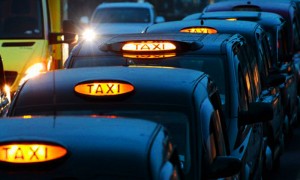 Every seventh taxi driver in the UK is a Pakistani. Many of them are overqualified for their jobs and hold university degrees. Does the UK need to reform its immigrant policies?
Every seventh taxi driver in the UK is a Pakistani. Many of them are overqualified for their jobs and hold university degrees. Does the UK need to reform its immigrant policies?
Umar Gul came to the UK in 2004, after graduating from the University of Peshawar, on a partial commonwealth scholarship to study Environment, Health and Safety at the University of Sunderland. Today, he drives a Hackney taxi in Nottingham, waiting on his British passport which will come next year.
“I finished my Masters degree in 16 months, in 2006. After that I was eligible to apply for a one-year post-study skill visa. I started working as a security guard on the weekends while looking for a job in my field.”
Gul waited in vain for many months to find employment that would meet the requirements of the UK home office. To get his visa extension, Gul needed to show the home office an earning of 18,000 pounds per annum.
“The jobs in my field of health and safety offered only 15-16 thousand pounds per annum to the freshers. I wanted to stay in the UK and explore my options further, so I decided to take up a job at a security company. They paid me 20,000 pounds per annum.”
After giving a string of interviews and being rejected twice in the finals. He kept sending out applications, waiting for interview calls but in two years time he was not offered a single job. He continued working as a security guard and his ‘post-study visa’ was also extended.
Gul is not alone in this ordeal. There is a wave of new immigrants who came to the UK after 7/7 on student visas and later got post-study work visas to never return to Pakistan. Not all of them are lucky to end up with white-collar jobs; they now either work as taxi drivers, security guards or in the kitchens as chefs or helpers.
Gul left his security guard job and started driving a taxi in 2009. “I drive five, six or sometimes even seven days a week. It depends on me, I am self-employed.”
Wasti, a lawyer in London says, “Pakistani education is not equivalent to British education. They can’t compete with people who have studied in the UK their whole lives. Then, there are many restrictions to work for immigrants, driving taxis is a flexible job. People like it for the unrestricted hours. But above all, they love the ‘cash in hand’ type of jobs.”
In such jobs, taxes are not deducted. With a first generation immigrants like Gul, there is a trend: Getting an indefinite visa. Their aim is to become British citizens by hook or crook. “A lot of these taxi drivers don’t have a work permit to drive taxis. They declare themselves self-employed at the home office. They pay their own taxes until they get an indefinite visa. After that, they apply for benefits. All these jobs become a bonus. If you look into the records, every seventh Pakistani is living on benefits in the UK,” say Mr. Wasti.
There are many first generation Pakistanis who are self-employed and earn up to 50 thousand per annum, mostly by driving taxis. It is obvious that they bring in their Pakistani tactics to avoid paying their taxes.
For Gul, his job as a taxi driver is fulfilling all his needs. He got married and brought his wife to Nottingham. He has a one-year old son. Gul sounds content as he says; with the earnings he can run his house in Notthingham and also manages to send money back home in Mohmand Agency, where his parents and siblings live. “I know if I save some money and go back to Pakistan someone will either kill me or kidnap me for ransom. It is for certain that I won’t even get a job that would pay my bills.”
Taxi and security guards jobs were popular with the old immigrants too, but they were not overqualified for the jobs. Many believe they had no choice.
Mr Wasti says, “There are difficult times in Pakistan. Here in the UK, even every council house has running tap water and no electricity failure. Above all, people are not nosy here. When someone asks what they do. No one says he is a cabbie. They instead simply say, he is at work.”
According to the Department for Transport’s National Taxi and Private Hire statistics, every seventh taxi driver in the UK is a Pakistani, who mostly drive private taxis. There are 1.2 million Pakistani in the total population of 63 million. This is a loss for economic potential for the UK. This occupation-education mismatch shows that there is a loophole in the UK immigrant policies and they need to reform them, not by bringing in “Immigrants Go Home” buses but by offering more jobs to them in their field of education. Everyone would benefit if these overqualified drivers would get out of their taxis.
- Names and locations have been changed to protect the identities of the Pakistani taxi drivers.
By: QURRATULAIN ZAMAN Source:Dawn.com
 UK Travellers Info about Places to visit in UK
UK Travellers Info about Places to visit in UK





